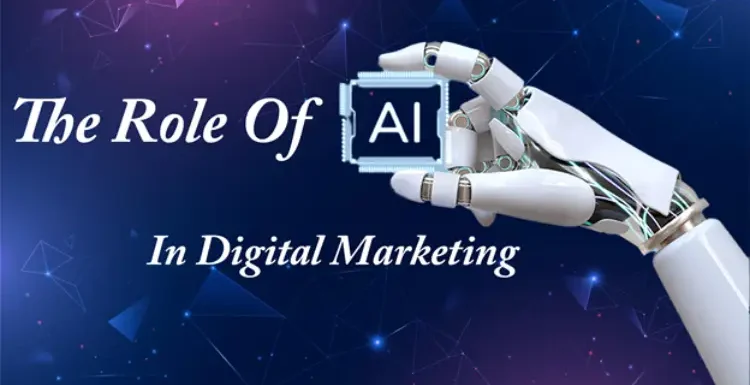
In today’s ever-evolving digital world, Artificial Intelligence (AI) and automation are no longer futuristic concepts—they are essential tools revolutionizing how brands connect with their audience. From delivering hyper-personalized content to streamlining workflows and enabling smart data-driven decisions, AI and automation are reshaping the way digital marketing operates. This article explores the transformative power of AI and automation and how marketers can leverage them to stay ahead of the curve.
AI for Hyper-Personalization
Personalization has become the cornerstone of effective digital marketing. Customers expect brands to understand their needs, preferences, and behaviors. AI enables marketers to analyze vast amounts of customer data and use that information to deliver tailored experiences across multiple touchpoints.
For instance, AI algorithms can analyze browsing history, past purchases, and engagement metrics to recommend products or services a user is more likely to be interested in.
E-commerce platforms like Amazon and streaming services like Netflix are already using such technology to great effect. Email marketing campaigns also benefit from AI, which helps create personalized subject lines, timing, and content based on user behavior.
AI-powered chatbots are another great example of personalization at scale. They provide 24/7 support, answer queries in real time, and guide users down the sales funnel by offering relevant product suggestions based on past interactions.
Automation Boosting Efficiency
Time is a critical resource in any marketing strategy. Automation tools have emerged as a game-changer by allowing marketers to automate repetitive tasks such as email scheduling, social media posting, campaign reporting, and lead nurturing.
Marketing automation platforms like HubSpot, Mailchimp, and ActiveCampaign enable businesses to create automated workflows that trigger based on user actions. For example, when a visitor downloads an eBook, a series of follow-up emails can be sent automatically over the next few days to nurture that lead.
In social media marketing, tools like Buffer and Hootsuite schedule and publish posts at optimal times, ensuring consistent engagement without manual effort. In paid advertising, platforms like Google Ads and Meta Ads use automated bidding strategies to optimize ad performance based on campaign goals.
These efficiencies allow marketing teams to focus more on strategy, creativity, and analysis rather than manual execution.
Smarter Data-Driven Decision Making
Data is at the heart of modern marketing, but raw data alone is not enough. The real power lies in how that data is interpreted and acted upon. AI excels at analyzing massive datasets to uncover patterns, predict outcomes, and suggest the best courses of action.
AI-powered analytics tools can help identify which campaigns are driving the most conversions, which audience segments are most engaged, and what content resonates best. Predictive analytics can forecast customer behavior, helping marketers proactively adjust their strategies.
For example, AI can help businesses anticipate customer churn by analyzing behavior signals and sending automated interventions like special offers or reminders. It can also determine the best times to post on social media, the ideal length of blog posts, or the most effective content types for a particular audience.
This level of insight helps marketers make informed decisions, reduce waste, and maximize ROI.
Real-World Applications: AI and Automation in Action
Let’s look at how businesses across industries are combining AI and automation for impactful results:
- Retail: A clothing brand uses AI to analyze customer purchase history and browsing behavior. Based on this data, automated email campaigns recommend new arrivals and restocked favorites, resulting in a significant boost in click-through and conversion rates.
- B2B Marketing: A SaaS company uses AI to score leads based on engagement and behavior. Once a lead reaches a specific score threshold, an automated email sequence is triggered, delivering personalized product demos and case studies.
- Customer Service: A telecom company implements AI chatbots to handle high volumes of customer queries. The bots handle 70% of inquiries without human intervention, freeing up human agents for more complex issues.
These examples show how AI and automation work together to enhance user experience, optimize resources, and drive measurable outcomes.
Challenges and Best Practices
While the benefits of AI and automation are immense, their implementation comes with challenges that marketers must navigate carefully.
- Data Privacy: With increasing concerns over data privacy, businesses must ensure that they handle customer data responsibly and comply with regulations like GDPR and CCPA.
- Bias and Accuracy: AI models can inherit biases from the data they are trained on. Marketers must regularly audit AI tools to ensure fairness and accuracy in targeting and messaging.
- Over-Automation: Relying too heavily on automation can make interactions feel robotic. Maintaining a human touch, especially in customer support and storytelling, remains crucial.
Best Practices:
- Start small and scale gradually.
- Combine human oversight with automated processes.
- Regularly review data sources and outputs.
- Always test AI-powered solutions against traditional methods.
The Future of AI in Digital Marketing
Looking ahead, AI is set to become even more integrated into digital marketing. Trends to watch include:
- AI-Generated Content: Tools like ChatGPT and Jasper are already enabling marketers to produce high-quality content quickly.
- Voice Search Optimization: With smart speakers and voice assistants on the rise, optimizing for voice queries is becoming essential.
- Visual Recognition: AI is advancing in image and video analysis, enabling better targeting through visual content.
As AI continues to evolve, marketers who embrace these tools thoughtfully will have a clear competitive edge.
Conclusion
AI and automation are not just buzzwords; they are redefining the fundamentals of digital marketing. From improving personalization and efficiency to enabling intelligent decision-making, these technologies empower marketers to deliver better results with fewer resources. Partnering with a digital marketing agency that specializes in AI-powered strategies can help businesses stay agile, relevant, and future-ready.
By integrating AI and automation into their strategies, businesses can stay agile, relevant, and future-ready.
